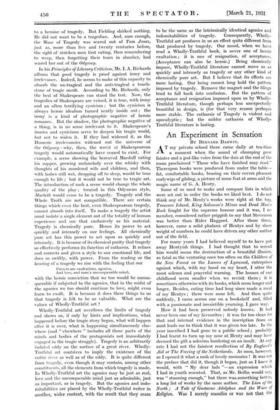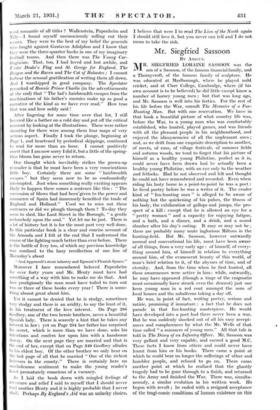An Experiment in Sensation
BY BERNARD DARWIN.
AT my private school there came daily at tea-time a moment when the sound of thumping grew fainter and a god-like voice from the dais at the end of the room proclaimed " Those who have finished may read." Thereupon books were produced from under the table— fat, comfortable books, bearing on their covers pleasant curlywigs of gilding, a picture of some feat at arms and the magic name of G. A. Henty.
Some of us used to make and compare lists in which were set out in order the books we liked best. I do not think any of Mr. Henty's works were right at the top. Treasure Island, King Solomon's Mines and Dead Man's Rock fought for the supreme honour and it was, I re- member, considered rather priggish to say that Stevenson was better than Rider Haggard. After those three, however, came a solid phalanx of Hentys and by sheer weight of numbers he could have driven any other author out of the field.
For many years I had believed myself to to have put away Hentyish things. I had thought that to reread him would mean the destruction of a beautiful illusion, as fatal as the venturing once too often on the Children of the New Forest or the Lances of Lynwood, enterprises against which, with my hand on my heart, I utter the most solemn and prayerful warning. The houses of our childhood seem smaller when we revisit them ; it is sometimes otherwise with its books, which seem longer and longer. Besides, eating time had long since made a meal of my Hentys ; there were none left. And then quite suddenly, I came across one on a bookshelf and, filled with a passionate and irresistible yearning, I gave way.
How it had been preserved nobody knows. It had never been one of my favourites ; it was far too clean for that and internal evidence in the inscription from an aunt leads me to think that it was given too late. In the year inscribed I had gone to a public school ; probably I had learnt to turn up my nose at Henty and may have deemed the gift a solecism bordering on an insult. At any rate I had not the faintest recollection of By England's Aid or The Freeing of the Netherlands. As soon, however, as I opened it what a rush of lovely memories ! It was not the preface that did it, though it began, just as I knew it would, with " My dear lads "—an expression which I had in youth resented. That, as Mr. Boffin would say, was " stunning enough," but there was,something better, a long list of works by the same author. The Lion of the North ; A Tale of Gustams Adolphus and the Wars of Religion. •Was I merely maudlin or was not that the most romantic of all titles ? Wallenstein, Papenheim and Tilly—I found myself unconsciously rolling out their names. They were to the best of my belief the generals who fought against Gustavus Adolphus and I know that they were the three-quarter backs in one of my imaginary football teams. And then there was The Young Car- thaginian. That, too, I had loved and lost awhile, and Under Drake's. Flag and St. George for England, The Dragon and the Raven and The Cat of Bubastes ; I cannot forbear the sensual gratification of writing them all down. And I worshipped in good company. The Spectator remarked of Bonnie Prince Charlie (in the advertisements at the end) that " The lad's hairbreadth escapes from the machinations of his father's enemies make up as good a narrative of the kind as we have ever read." How true that was and how nobly said !
After lingering for some time over that list, I still hovered like a bather on a cold day and put off the critical moment by looking at the illustrations. These were rather daunting for there were among them four maps of very serious aspect. Finally I took the plunge, beginning at Page 1, and heartened by periodical skippings, continued to read for more than an 'hour. I cannot positively assert that I am now sorry I did it, but a little of the spring- time bloom has gone never to return.
One thought which inevitably strikes the grown-up re-reader is that he must have been a very conscientious little boy. Certainly there are some " hairbreadth escapes " but they seem now to be so confoundedly interrupted. Just when something really exciting appears likely to happen there comes a sentence like this : " The succession of blows that had beer given to the power and commerce of Spain had immensely benefited the trade of England and Holland." Used we to miss out these sentences or did we plough through them ? To-day they seem to shed, like Lant Street in the Borough, " a gentle melancholy upon the soul." Yet let me be just. There is a lot of history but it is for the most part very well done. In this particular book is a clear and concise account of the Armada and I felt at the end that I understood the course of the fighting much better than ever before. There is the battle of Ivry too, of which my previous knowledge was confined to the hazy recollection of one line of Maeaulay's about
And Appenzell's stout infantry and Egmont's Flemish Spears."
Moreover I have remembered beloved Papenheim for over forty years and Mr. Henty must have had something of a way with him to make me do that. And how prodigiously the man must have toiled to turn out two or three of these books every year ! There is some- thing almost great about him.
Yet it cannot be denied that he is stodgy, sometimes very stodgy and there is an aridity, to say the least of it, in his treatment of the love interest. On Page 286 Geoffrey, one of the two heroic brothers, saves a beautiful Spanish lady. There is scarcely a hint that he takes any interest in her ; yet on Page 294 her father has surprised his secret, which is more than we have done, asks his intentions and confers her upon him with a handsome dowry. On the next page they are married and that is the end of her, except that on Page 340 Geoffrey alludes to his eldest boy. Of the other brother we only hear on the last page of all that he married " One of the richest heiresses in the county." There is certainly here no unwholesome sentiment to make the young reader's heart prematurely conscious of a vacancy.
As I laid the book down with mingled feelings of reverence and relief I said to myself that I should never read another Henty and it is highly probable- that I never shall. Perhaps By England's Aid was an unlucky choice. I believe that were I to read The Lion of the North again I should still love it, but you never can tell and I do not mean to take the risk.



















































 Previous page
Previous page